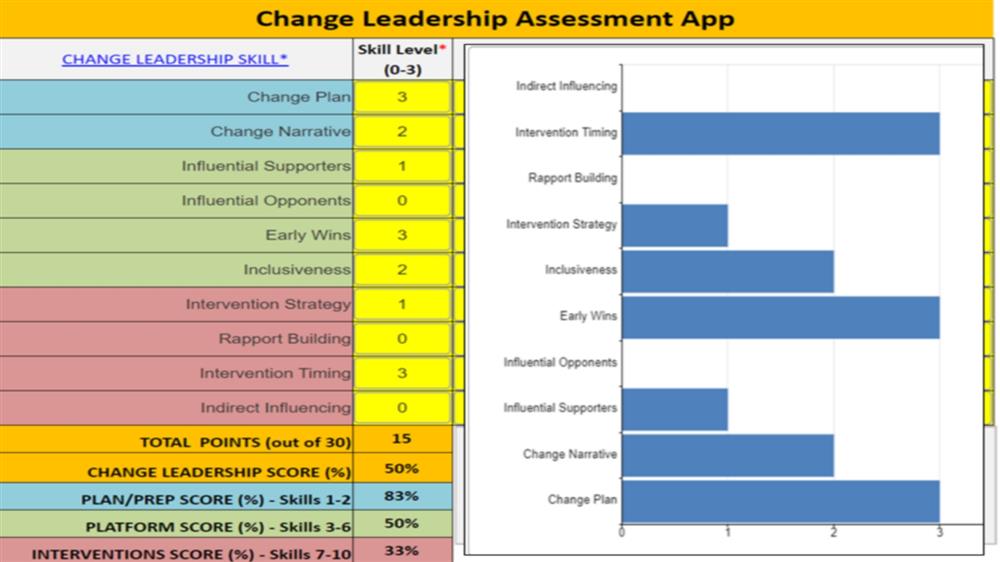Photo by Charles Forerunner
In our popular change management simulation (COHORT) participants are facilitated to discover experientially the essentials of change leadership using a simulation and two key artefacts – a list of key principles and a set of key skills (and a free online app) for effective change leadership. These tools can be used for accelerating skills development through live scenario experience, discussion, self-reflection and self-assessment.
Ten Change Leadership Principles
We don’t try and teach the key principles of change leadership at the start of a simulation – this is simply not very effective from an experiential learning perspective. Instead we just lightly introduce the principles at the start to arouse the curiosity of the learners - some of whom may decide to study them if they so choose.
The facilitator will point out when a principle is relevant to something that has happened during the simulation as it progresses. Note that this happens in no fixed order and at different times for different teams and learners. It is unlikely that all ten principles will be referenced in this way. Then at the end of the simulation we circle back on the principles again in more detail to enable the participants to effectively tick off the ones they have personally experienced during the simulation and to be aware of the principles they have not yet experienced.
These change leadership principles are deliberately generic which makes them easy to grasp but also allows our clients to overlay their own change methodologies (such as Lewin’s ICE model or Kotter’s 8 Stages) on top of them without any conflict. I sometimes refer to the principles as the physics of change as they operate at the (detailed) nuclear level whereas change methodologies operate at a (higher) molecular level.
The key change leadership principles can be summarised as follows:
1. Build as much insight and relationship as you can with an individual BEFORE you intervene.
2. Make appropriate interventions which are relevant to the individual’s attitude (e.g. don’t ask an opponent to become a champion) and use light touch interventions (e.g. opinion/advice seeking) with those who are negative.
3. Build on influential supporters rather than neutralising opponents however……
4. Don't neglect high-profile opponents – they could derail the change if ignored.
5. Intervene with those who have influence over others (through their authority or social reputation) and make them champions.
6. Intervene with those you can influence (which depends on their relationship with you and their openness to the proposed change).
7. Don’t neglect indirect interventions (e.g. teams and colleagues) as well as direct (one on one) interventions.
8. Never stop nurturing supporters otherwise enthusiasm and commitment can wane.
9. Be patient – adoption is often slow to start – if you are confident you are doing the right things then stick with it even if initial results are not yet apparent.
10. Be creative – sometimes you just need to do something not in the standard playbook!
A much more detailed explanation of these principles is available in our Change Management Book.
Ten Change Leadership Skills
At the end of the simulation once we have reviewed the key principles with the participants and teams we introduce the second artefact – the Ten key change leadership skills. And rather than trying to teach them in detail at the start, which is not effective, we now encourage the learners to use them to conduct a self-assessment of their performance during the simulation.
The key change leadership skills can be summarised as follows:
A. Change Planning
Skill 1. Developing, following and adjusting a well-researched change plan.
Skill 2. Developing and communicating a compelling change narrative.
B. Change Platform
Skill 3. Building around influential supporters.
Skill 4. Engaging influential opponents early.
Skill 5. Getting early wins (change champions).
Skill 6. Broadening change platform when required (and not neglecting people).
C. Change Interventions
Skill 7. Evidence of an intervention strategy.
Skill 8. Building rapport where necessary first before making other interventions.
Skill 9. The right intervention at the right time.
Skill 10. Making use of both direct and indirect interventions.
Change Leadership Assessment App
The learners can perform their self-assessment using pencil and paper or they can use our simple mobile phone app to record their scores. This makes it easy to provide them with a permanent record to feed into their post-simulation skills development discussions on this key topic.
You may freely access the Change Leadership Self-Assessment app here. The app is web-based – no registrations, logins or software downloads are required.
